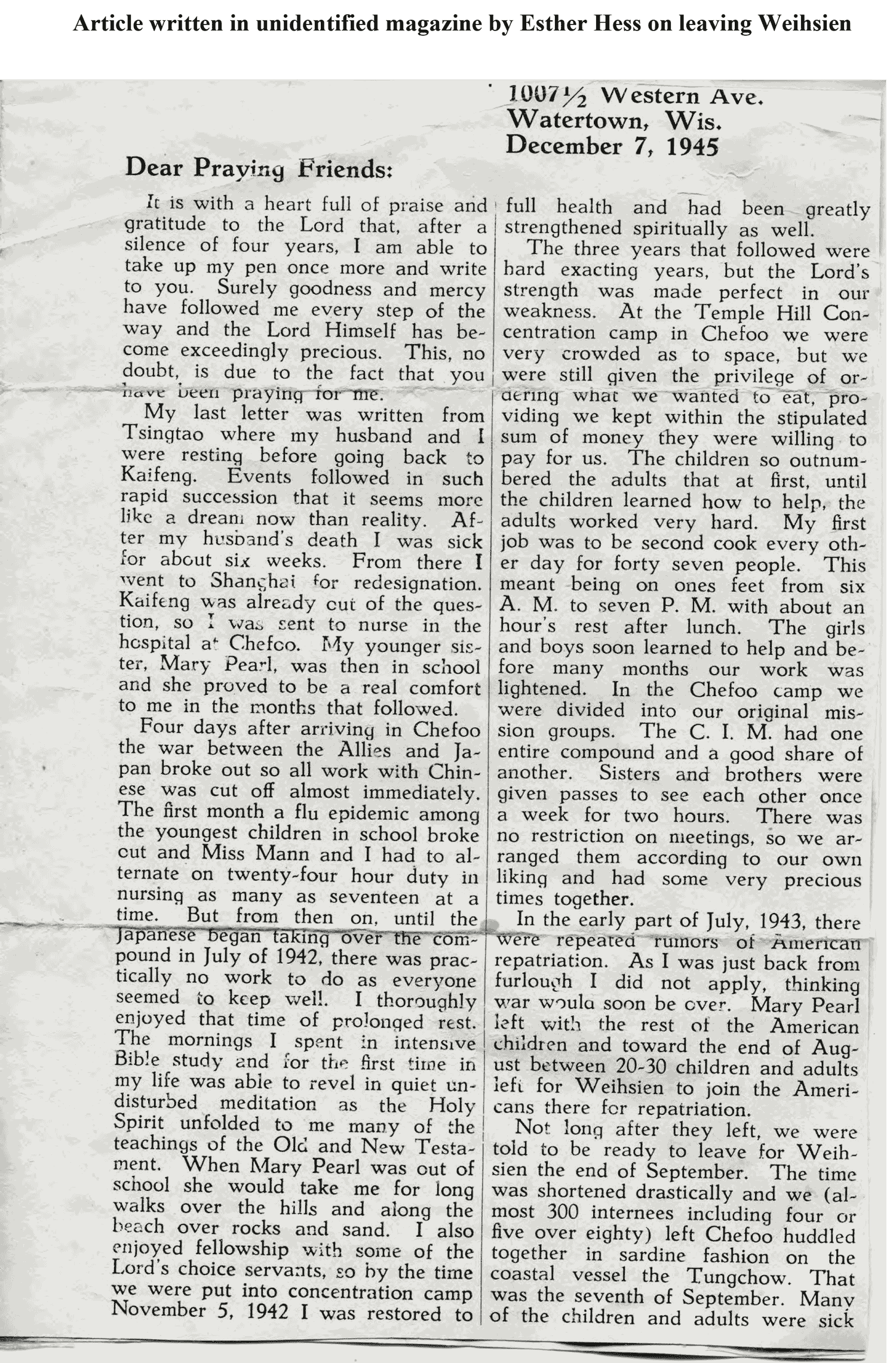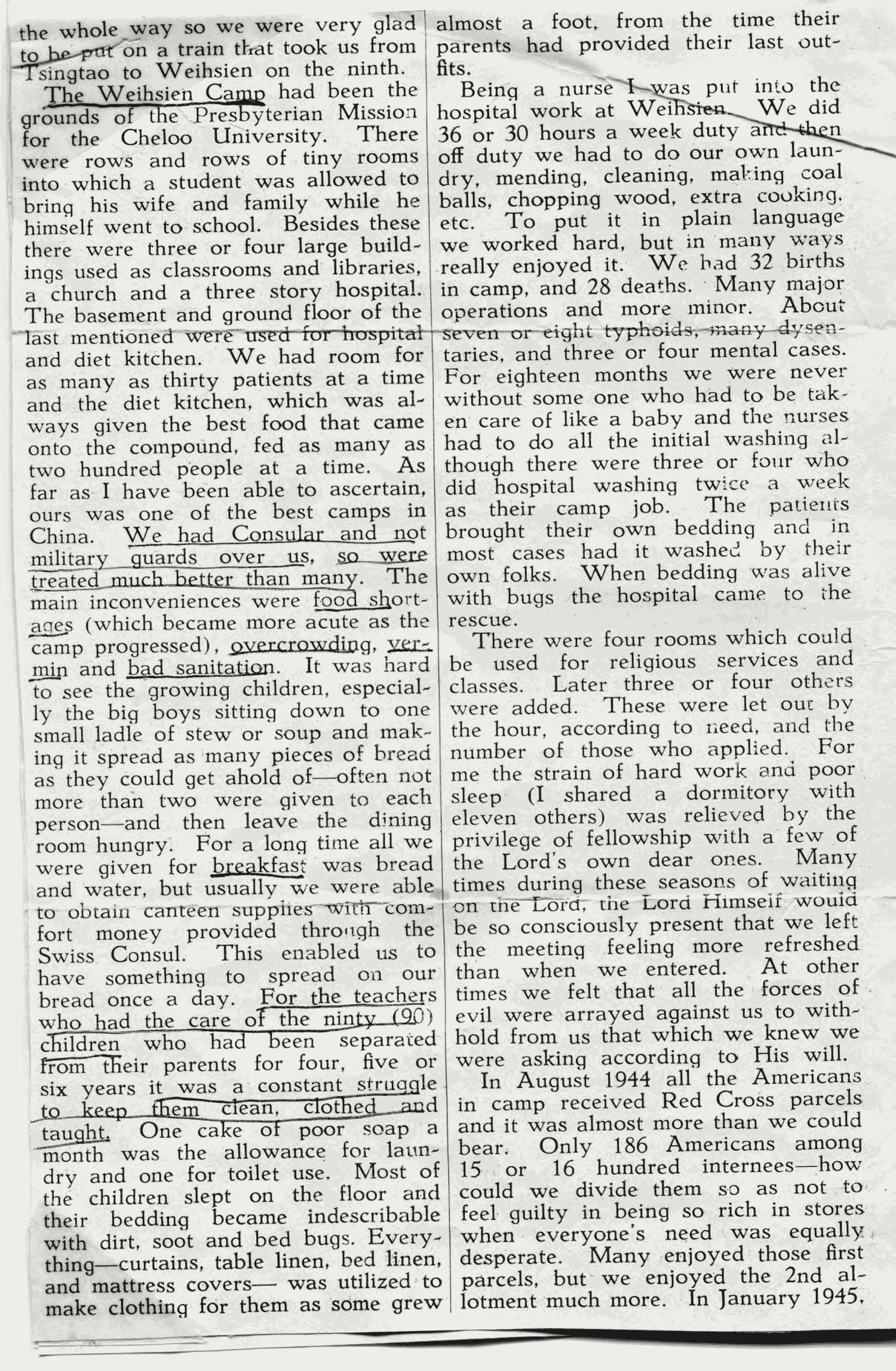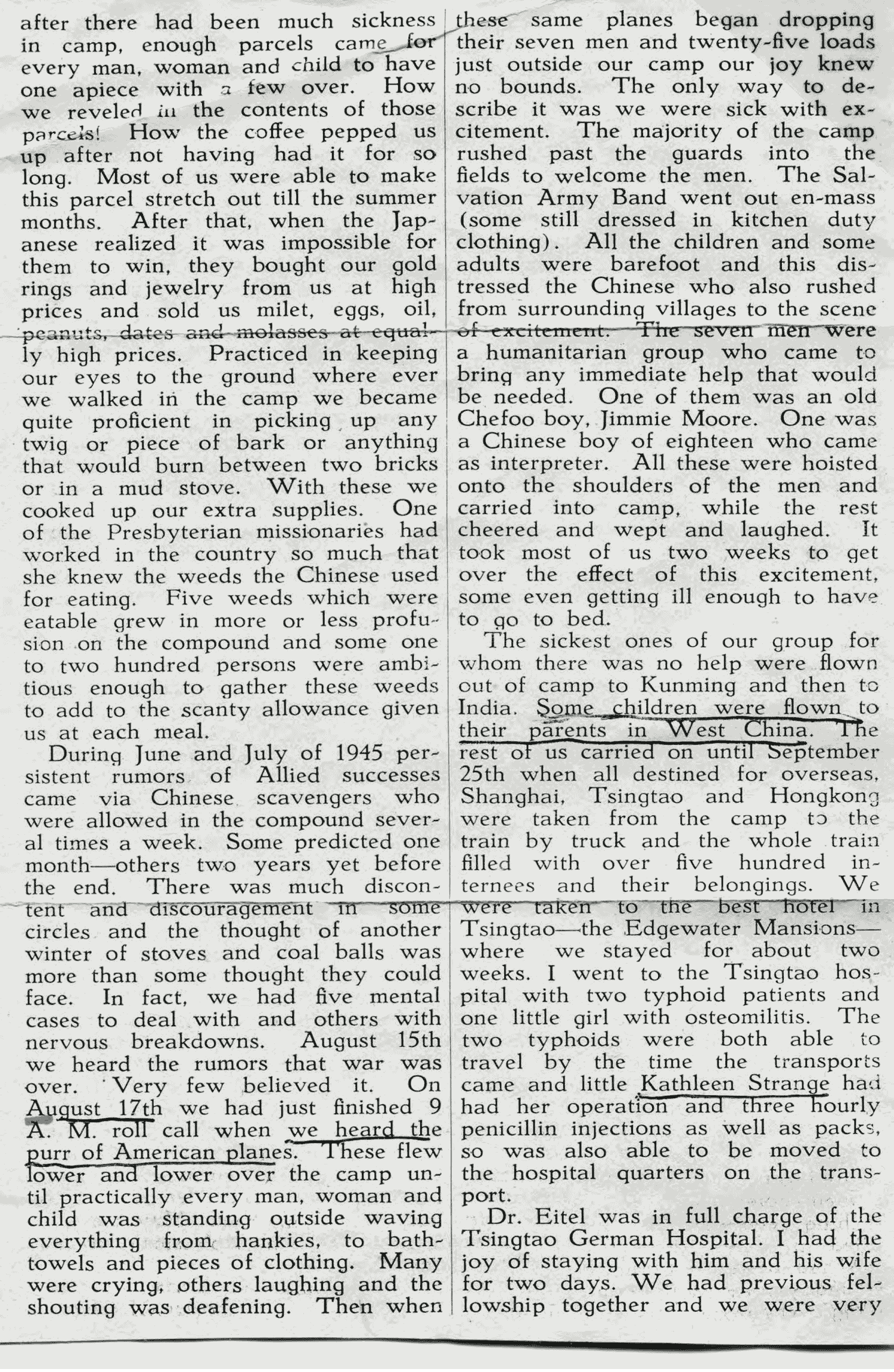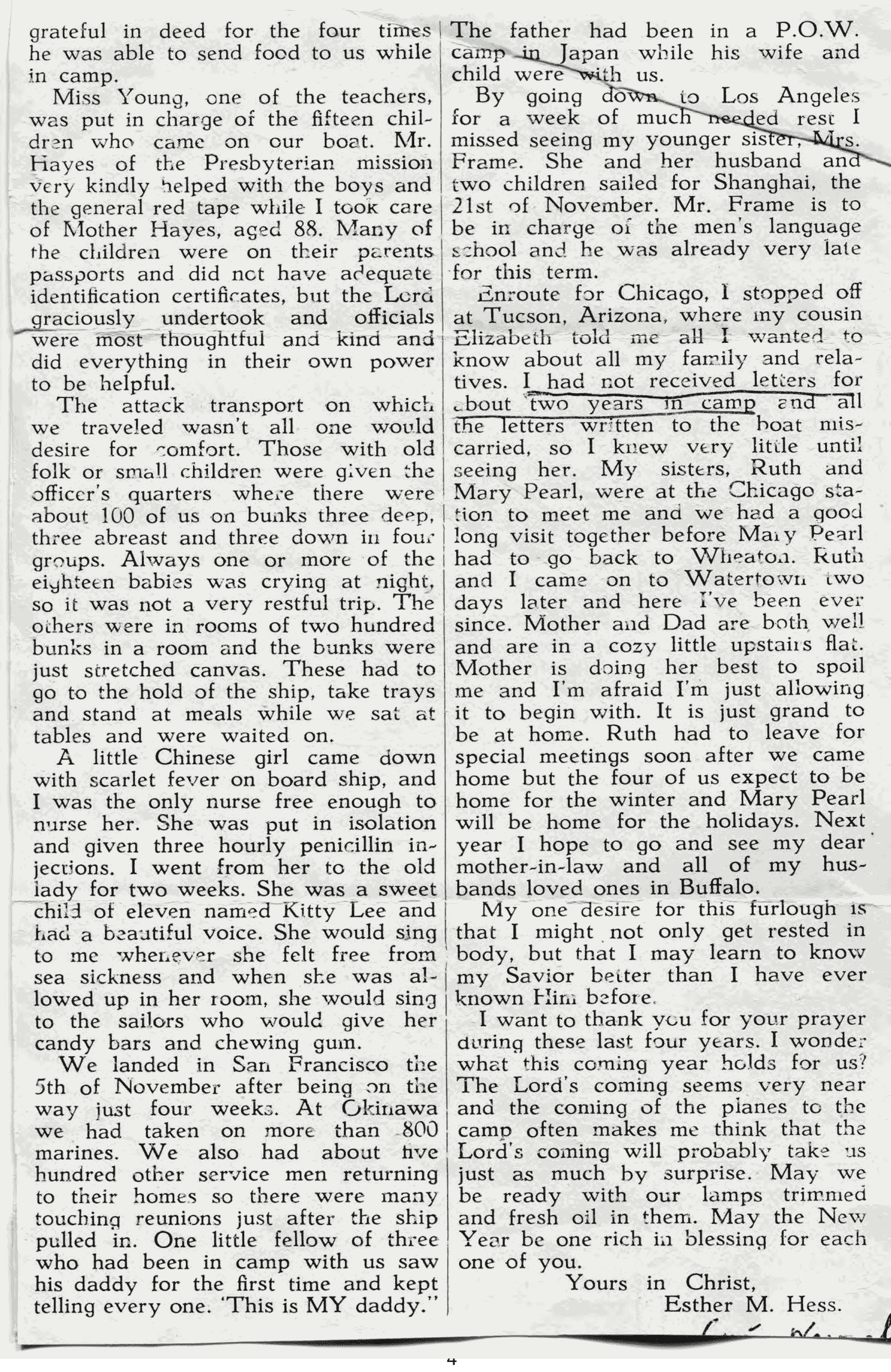




Article written in unidentified magazine by Esther Hess on leaving Weihsien
1007½ Western Ave.
Watertown, Wis.
December 7, 1945
Dear Praying Friends:
It is with a heart full of praise and gratitude to the Lord that, after a silence of four years, I am able to take up my pen once more and write to you. Surely goodness and mercy have followed me every step of the way and the Lord Himself has become exceedingly precious. This, no doubt, is due to the fact that you have been praying for me.
My last letter was written from Tsingtao where my husband and I were resting before going back to Kaifeng. Events followed in such rapid succession that it seems more like a dream now than reality. After my husband's death I was sick for about six weeks. From there I went to Shanghai for redesignation. Kaifeng was already cut of the question, so I was sent to nurse in the hospital at Chefoo. My younger sister, Mary Pearl, was then in school and she proved to be a real comfort to me in the months that followed.
Four days after arriving in Chefoo the war between the Allies and Japan broke out so all work with Chinese was cut off almost immediately. The first month a flu epidemic among the youngest children in school broke out and Miss Mann and I had to alternate on twenty-four hour duty in nursing as many as seventeen at a time. But from then on, until the Japanese began taking over the compound in July of 1942, there was practically no work to do as everyone seemed to keep well. I thoroughly enjoyed that time of prolonged rest. The mornings I spent in intensive Bible study and or the first time in my life was able to revel in quiet undisturbed meditation as the Holy Spirit unfolded to me many of the teachings of the Old and New Testament. When Mary Pearl was out of school she would take me for long walks over the hills and along the beach over rocks and sand. I also enjoyed fellowship with some of the Lord's choice servants, so by the time we were put into concentration camp November 5, 1942 I was restored to full health and had been greatly strengthened spiritually as well.
The three years that followed were hard exacting years, but the Lord's strength was made perfect in our weakness. At the Temple Hill Concentration camp in Chefoo we were very crowded as to space, but we were still given the privilege of ordering what we wanted to eat, providing we kept within the stipulated sum of money they were willing to pay for us. The children so outnumbered the adults that at first, until the children learned how to help, the adults worked very hard. My first job was to be second cook every other day for forty seven people. This meant being on ones feet from six A. M. to seven P. M. with about an hour's rest after lunch. The girls and boys soon learned to help and before many months our work was lightened. In the Chefoo camp we were divided into our original mission groups. The C. I. M. had one entire compound and a good share of another. Sisters and brothers were given passes to see each other once a week for two hours. There was no restriction on meetings, so we arranged them according to our own liking and had some very precious times together.
In the early part of July, 1943, there were repeated rumors of American repatriation. As I was just back from furlough I did not apply, thinking war would soon be over. Mary Pearl left with the rest of the American children and toward the end of August between 20-30 children and adults left for Weihsien to join the Americans there for repatriation.
Not long after they left, we were told to be ready to leave for Weihsien the end of September. The time was shortened drastically and we (almost 300 internees including four or five over eighty) left Chefoo huddled together in sardine fashion on the coastal vessel the Tungchow. That was the seventh of September. Many of the children and adults were sick the whole way so we were very glad to put on a train that took us from Tsingtao to Weihsien on the ninth.
The Weihsien Camp had been the grounds of the Presbyterian Mission for the Cheloo University. There were rows and rows of tiny rooms into which a student was allowed to bring his wife and family while he himself went to school. Besides these there were three or four large buildings used as classrooms and libraries, a church and a three story hospital. The basement and ground floor of the last mentioned were used for hospital and diet kitchen. We had room for as many as thirty patients at a time and the diet kitchen, which was always given the best food that came onto the compound, fed as many as two hundred people at a time. As far as I have been able to ascertain, ours was one of the best camps in China. We had Consular and not military guards over us, so were treated much better than many. The main inconveniences were food shortages (which became more acute as the camp progressed), overcrowding, vermin and bad sanitation. It was hard to see the growing children, especially the big boys sitting down to one small ladle of stew or soup and making it spread as many pieces of bread as they could get ahold of — often not more than two were given to each person — and then leave the dining room hungry. For a long time all we were given for breakfast was bread and water, but usually we were able to obtain canteen supplies with comfort money provided through the Swiss Consul. This enabled us to have something to spread on our bread once a day. For the teachers who had the care of the ninty (90) children who had been separated from their parents for four, five or six years it was a constant struggle to keep them clean, clothed and taught. One cake of poor soap a month was the allowance for laundry and one for toilet use. Most of the children slept on the floor and their bedding became indescribable with dirt, soot and bed bugs. Everything—curtains, table linen, bed linen, and mattress covers— was utilized to make clothing for them as some grew almost a foot, from the time their parents had provided their last outfits.
Being a nurse I was put into the hospital work at Weihsien . We did 36 or 30 hours a week duty and then off duty we had to do our own laundry, mending, cleaning, making coal balls, chopping wood, extra cooking. etc. To put it in plain language we worked hard, but in many ways really enjoyed it. We had 32 births in camp, and 28 deaths. Many major operations and more minor. About seven or eight typhoids, many dysenteries, and three or four mental cases. For eighteen months we were never without some one who had to be taken care of like a baby and the nurses had to do all the initial washing although there were three or four who did hospital washing twice a week as their camp job. The patients brought their own bedding and in most cases had it washed by their own folks. When bedding was alive with bugs the hospital came to the rescue.
There were four rooms which could be used for religious services and classes. Later three or four others were added. These were let out by the hour, according to need, and the number of those who applied. For me the strain of hard work and poor sleep (I shared a dormitory with eleven others) was relieved by the privilege of fellowship with a few of the Lord's own dear ones. Many times during these seasons of waiting on the Lord Himself would be so consciously present that we left the meeting feeling more refreshed than when we entered. At other times we felt that all the forces of evil were arrayed against us to withhold from us that which we knew we were asking according to His will.
In August 1944 all the Americans in camp received Red Cross parcels and it was almost more than we could bear. Only 186 Americans among 15 or 16 hundred internees—how could we divide them so as not to feel guilty in being so rich in stores when everyone's need was equally desperate? Many enjoyed those first parcels, but we enjoyed the 2nd allotment much more. In January 1945 after there had been much sickness in camp, enough parcels came for every man, woman and child to have one apiece with a few over. How we revelled in the contents of those parcels! How the coffee pepped us up after not having had it for so long. Most of us were able to make this parcel stretch out till the summer months. After that, when the Japanese realized it was impossible for them to win, they bought our gold rings and jewelry from us at high prices and sold us millet, eggs, oil, peanuts, dates and molasses at equally high prices. Practiced in keeping our eyes to the ground where ever we walked in the camp we became quite proficient in picking up any twig or piece of bark or anything that would burn between two bricks or in a mud stove. With these we cooked up our extra supplies. One of the Presbyterian missionaries had worked in the country so much that she knew the weeds the Chinese used for eating. Five weeds which were eatable grew in more or less profusion on the compound and some one to two hundred persons were ambitious enough to gather these weeds to add to the scanty allowance given us at each meal.
During June and July of 1945 persistent rumors of Allied successes came via Chinese scavengers who were allowed in the compound several times a week. Some predicted one month -- others two years yet before the end. There was much discontent and discouragement in some circles and the thought of another winter of stoves and coal balls was more than some thought they could face. In fact, we had five mental cases to deal with and others with nervous breakdowns. August 15th we heard the rumors that war was over. Very few believed it. On August 17th we had just finished 9 A.M. roll call when we heard the purr of American planes. These flew lower and lower over the camp until practically every man, woman and child was standing outside waving everything from hankies, to bath-towels and pieces of clothing. Many were crying, others laughing and the shouting was deafening. Then when these" same planes began dropping their seven men and twenty-five loads just outside our camp our joy knew no bounds. The only way to describe it was we were sick with excitement. The majority of the camp rushed past the guards into the fields to welcome the men. The Salvation Army Band went out en-mass (some still dressed in kitchen duty clothing). All the children and some adults were barefoot and this distressed the Chinese who also rushed from surrounding villages to the scene of excitement. The seven men were a humanitarian group who came to bring any immediate help that would be needed. One of them was an old Chefoo boy, Jimmie Moore. One was a Chinese boy of eighteen who came as interpreter. All these were hoisted onto the shoulders of the men and carried into camp, while the rest cheered and wept and laughed. It took most of us two weeks to get over the effect of this excitement, some even getting ill enough to have to go to bed.
The sickest ones of our group for whom there was no help were flown out of camp to Kunming and then to India. Some children were flown to their parents in West China. The rest of us carried on until September 25th when all destined for overseas, Shanghai, Tsingtao and Hong Kong were taken from the camp to the train by truck and the whole train filled with over five hundred internees and their belongings. We were taken to the best hotel in Tsingtao—the .Edgewater Mansions—where we stayed for about two weeks. I went to the Tsingtao hospital with two typhoid patients and one little girl with osteomilitis. The two typhoids were both able to travel by the time the transports came and little Kathleen Strange had had her operation and three hourly penicillin injections as well as packs, so was also able to be moved to the hospital quarters on the transport.
Dr. Eitel was in full charge of the Tsingtao German Hospital. I had the joy of staying with him and his wife for two days. We had previous fellowship together and we were very grateful in deed for the four times he was able to send food to us while in camp.
Miss Young, one of the teachers, was put in charge of the fifteen children who came on our boat. Mr. Hayes of the Presbyterian mission very kindly helped with the boys and the general red tape while I took care of Mother Hayes, aged 88. Many of the children were on their parents passports and did not have adequate identification certificates, but the Lord graciously undertook and officials were most thoughtful and kind and did everything in their own power to be helpful.
The attack transport on which we traveled wasn't all one would desire for comfort. Those with old folk or small children were given the officer's quarters where there were about 100 of us on bunks three deep, three abreast and three down in four groups. Always one or more of the eighteen babies was crying at night, so it was not a very restful trip. The others were in rooms of two hundred bunks in a room and the bunks were just stretched canvas. These had to go to the hold of the ship, take trays and stand at meals while we sat at tables and were waited on.
A little Chinese girl came down with scarlet fever on board ship, and I was the only nurse free enough to nurse her. She was put in isolation and given three hourly penicillin injections. I went from her to the old lady for two weeks. She was a sweet child of eleven named Kitty Lee and had a beautiful voice. She would sing to me whenever she felt free from sea sickness and when she was allowed up in her room, she would sing to the sailors who would give her candy bars and chewing gum.
We landed in San Francisco the 5th of. November after being on the way just four weeks. At Okinawa we had taken on more than 800 marines. We also had about five hundred other service men returning to their homes so there were many touching reunions just after the ship pulled in. One little fellow of three who had been in camp with us saw his daddy for the first time and kept telling every one. “This is MY daddy."
The father had been in a P.O.W. camp in Japan while his wife and child were with us.
By going o to Los Angeles for a week of much needed rest I missed seeing my younger sister, Mrs Frame. She and her husband and two children sailed for Shanghai, the 21st of November. Mr. Frame is to be in charge of the men's language school and he was already very late for this term.
En route for Chicago, I stopped off at Tucson, Arizona, where my cousin Elizabeth told me all I wanted to know about all my family and relatives. I had not received letters for about .two years in camp and all the letters written to the boat miscarried, so I knew very little until seeing her. My sisters, Ruth and Mary Pearl, were at the Chicago station to meet me and we had a good long visit together before Mary Pearl had to go back to Wheaton. Ruth and I came on to Watertown two days later and here I've been ever since. Mother and Dad are both well and are in a cozy little upstairs flat. Mother is doing her best to spoil me and I'm afraid I'm just allowing it to begin with. It is just grand to be at home. Ruth had to leave for special meetings soon after we came home but the four of us expect to be home for the winter and Mary Pearl will be home for the holidays. Next year I hope to go and see my dear mother-in-law and all of my husbands loved ones in Buffalo.
My one desire for this furlough is that I might not only get rested in body, but that I may learn to know my Savior better than I have ever known Hire before.
I want to thank you for your prayer during these last, four years. I wonder what this coming year holds for us? The Lord's coming seems very near and the coming of the planes to the camp often makes me think that the Lord's coming will probably take us just as much by surprise. May we be ready with our lamps trimmed and fresh oil in them. May the New Year be one rich in blessing for each one of you.
Yours in Christ,
Esther M. Hess.
#






